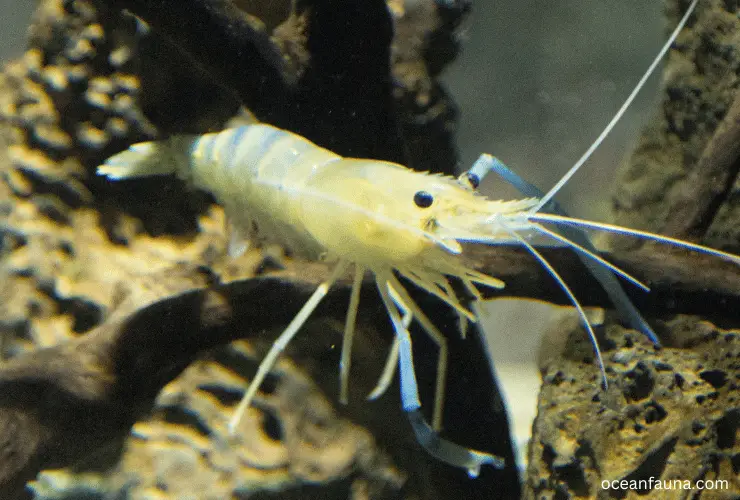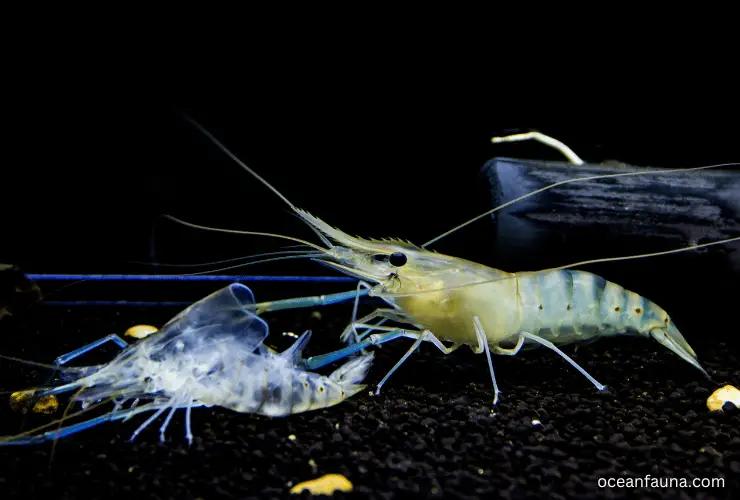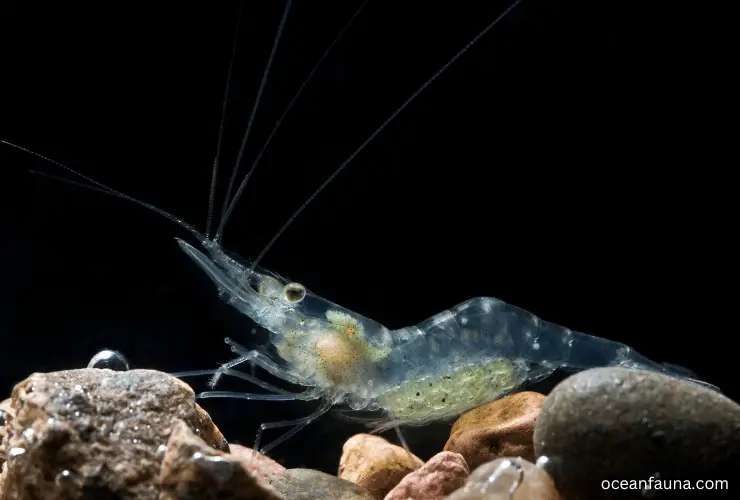Do shrimp sleep? Yes, shrimps do sleep, but their sleeping pattern varies. Some prefer to sleep at night, while most shrimp sleep during the day. However, they do not experience deep sleep like humans. Instead, they rest briefly to save energy. When sleeping, they tend to have minimal movement, be unresponsive to external stimulation, and have a lower heart rate.
In this blog, I will describe the sleeping cycle of shrimp and the behaviors they display when sleeping.
How Do Shrimps Sleep?
Shrimps, especially dwarf shrimps, exhibit unique behaviors when it comes to sleeping. They do sleep, but in a way that is different from how humans and some animals sleep.
When shrimps are asleep, they usually stay in one place and do not move much. They also show a decreased level of responsiveness to external stimuli, meaning that they are less likely to react to sounds or movements around them. In addition, their heart rate also tends to slow down.
Some species of shrimps, such as the red cherry shrimp, are known to sleep upside down, with their antennae lowered down. This behavior, which is known as “inverted resting,” is believed to be a way for them to conserve energy and protect themselves from predators.
Remember, shrimps do not have eyelids, so they cannot close their eyes while they sleep. Instead, they rely on other mechanisms to protect their eyes, such as retracting them into their eye sockets or covering them with their antennae.
Are Shrimps Nocturnal? [Sleeping Time]
Yes, shrimps are nocturnal animals, meaning that they are primarily active during the night. However, they can also be seen in various pools and riffles in the forest during the day. During the night, they tend to gather on submerged rocks, tree branches, roots, and leaves and become very active.

Despite being active at night, shrimps also need to sleep. They tend to sleep or become less active during the day, which is when they are most vulnerable to predators. This is because shrimps have evolved to protect themselves as best they can from larger water animals that could prey on them.
Interestingly, shrimps have also been known to exhibit a behavior called “dual rhythm” or “bimodal activity pattern.”
This means they have two activity peaks during a 24-hour cycle, with one peak during the day and another peak at night. This allows shrimps to be active during the day when there is less competition for resources and at night when they are better able to avoid predators.
Do Shrimp Sleep a Lot?
Based on research, it can be said that shrimps do sleep, but not in the same way that humans or other animals do. It is observed that shrimp spend a significant amount of time being idle, which can be interpreted as sleeping.
However, during this time, shrimps are not fully asleep but instead remain motionless or at rest, conserving energy and allowing their bodies to recuperate. Shrimps are believed to be more active during night-time when they spend the bulk of their time foraging for food and engaging in other activities.
It is also not easy to determine the exact amount of time that shrimps sleep, as it can vary depending on the individual shrimp and its environment. Generally, it is estimated that shrimps sleep for around eight to twelve hours a day, but this might not be constant for all shrimps.
Moreover, the sleep pattern of shrimp can change depending on factors such as light exposure, temperature, and the presence of predators.
When it comes to shrimp sleep behaviors, some studies suggest that shrimps tend to be more active and alert during daylight hours, while others suggest that they are more active at night. It has also been observed that shrimps might exhibit sleep-like behaviors during times of stress or illness, such as remaining motionless or hiding in their shelters.
Do Shrimps Dream?
It is not known if shrimps dream or not, as this behavior has never been observed in them. Given that shrimp lack a neocortex—the part of the brain responsible for dreaming—they are unlikely to exhibit any type of dream-like behavior while sleeping.

However, their sleeping pattern suggests that they are able to protect themselves from predators and conserve energy while sleeping. This means that shrimps likely engage in some type of restorative behavior, such as dreaming, even if it is not observable.
Do Shrimps Have a Memory?
Yes, shrimps, particularly the mantis shrimp, cleaner shrimp, pistol shrimp, and hermit crabs, have been found to possess memory and learning capabilities. Recent research studying these sea creatures revealed that their brains have mushroom bodies, which play a crucial role in storing long-term memory.
Mushroom bodies are also found in insects and serve as centers for learning and memory formation. The discovery of these structures in the brains of shrimps is remarkable since it was formerly believed that only insects had these specific brain structures.
Studies conducted on the mantis shrimp’s memory have helped to reveal their keen memory abilities. Mantis shrimp can recognize other individuals they have previously encountered, and they remember their encounters with other species. This is a remarkable feat, especially given the complex social interactions among these creatures.

Cleaner shrimp also have remarkable memory capabilities. They can recall the chemical cues of their clients and can remember those they have serviced before. On the other hand, Pistol shrimps can remember the acoustic cues of their refuge locations and use this memory to find their way back.
Hermit crabs have also been observed to have memory retention capabilities. They can remember the visual cues of potential predator threats and avoid them in the future.
Do Aquarium Shrimps Sleep?
Yes, aquarium shrimps do sleep. In fact, they tend to sleep more than their wild counterparts, averaging around 8-12 hours of sleep during the day period.
While the exact reason for their increased sleep patterns is not fully understood, it is believed to be due to a combination of factors.
One contributing factor is the lack of activity in aquarium environments compared to the natural habitats of wild shrimps. Since they do not need to search for food or evade predators in an aquarium, they may have more time for rest and sleep.
Another possible factor is the consistent and controlled lighting in aquariums. Like many other animals, shrimps have an internal circadian rhythm that governs their sleep-wake cycle.
In aquariums, this rhythm is often regulated through artificial lighting schedules, which can promote more regular sleep patterns.
Despite their increased sleep time, shrimps are still relatively active while they are awake in aquariums. They often engage in behaviors such as scavenging for food and interacting with other aquarium inhabitants, which can help promote overall wellness and health.
Conclusion
Hopefully, you understand that shrimps do sleep and have memory capabilities. They tend to sleep more in aquariums than they do in their natural habitats because of the lack of predators and the consistency of light.
Although researchers are still unsure what exact behaviors shrimps engage in while sleeping, they believe that it may involve some form of restorative behavior, such as dreaming.
If you have any further queries, let me know.

